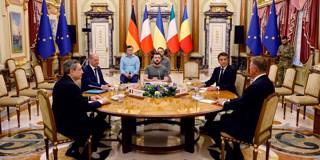Born of the need to preserve peace on a historically war-torn continent, the European Union and its political leaders are now being forced to rethink some of their most important principles. For the European project to stay the same, everything must change.
BERLIN – For seven decades, European integration has been driven by the quest for peace. But since Russia’s invasion of Ukraine on February 24, Europe has found itself unifying in response to war. The peace project has given way to a war project, and this fundamental shift is forcing European governments to reconsider some of their longest-held principles.
Most obviously, they now must concern themselves with hard power. There has been much discussion about German rearmament, Denmark’s decision to participate in European joint defense arrangements, and Sweden and Finland’s bid for NATO membership. Taboos have been broken, with European Union member states sending heavy weapons to Ukraine and the EU’s “peace facility” pledging €2 billion ($2.1 billion) to arm that beleaguered country. Moreover, the EU has fashioned its economy into a weapon to use against Russia, and it is now planning for a war economy, where security will take priority over efficiency.
A second major change is that Europeans must rethink interdependence. European integration previously reflected the belief that economic links between countries would create a foundation for political reconciliation. That was the idea behind the original European Coal and Steel Community (the precursor to the EU), which turned former enemies into friends by merging the national industries that had produced the munitions for World War II. The hope was that even if economic links between countries did not make war impossible, they would at least prevent a dangerous escalation in tensions.

BERLIN – For seven decades, European integration has been driven by the quest for peace. But since Russia’s invasion of Ukraine on February 24, Europe has found itself unifying in response to war. The peace project has given way to a war project, and this fundamental shift is forcing European governments to reconsider some of their longest-held principles.
Most obviously, they now must concern themselves with hard power. There has been much discussion about German rearmament, Denmark’s decision to participate in European joint defense arrangements, and Sweden and Finland’s bid for NATO membership. Taboos have been broken, with European Union member states sending heavy weapons to Ukraine and the EU’s “peace facility” pledging €2 billion ($2.1 billion) to arm that beleaguered country. Moreover, the EU has fashioned its economy into a weapon to use against Russia, and it is now planning for a war economy, where security will take priority over efficiency.
A second major change is that Europeans must rethink interdependence. European integration previously reflected the belief that economic links between countries would create a foundation for political reconciliation. That was the idea behind the original European Coal and Steel Community (the precursor to the EU), which turned former enemies into friends by merging the national industries that had produced the munitions for World War II. The hope was that even if economic links between countries did not make war impossible, they would at least prevent a dangerous escalation in tensions.